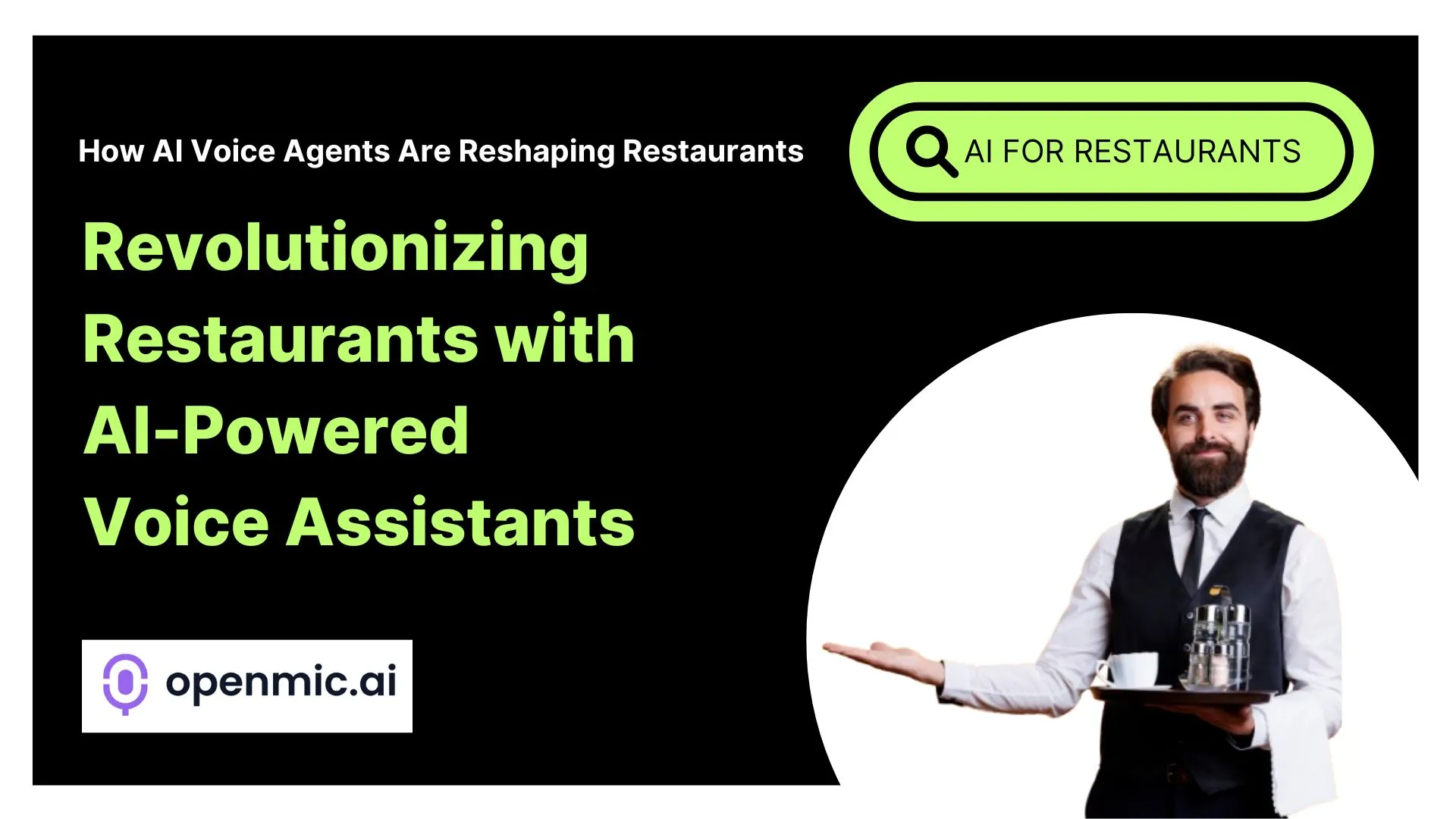
How AI Voice Agents Are Revolutionizing Restaurant industry & Enhancing Customer Experience
The restaurant world is changing fast. One big reason? AI voice agents. These smart systems are transforming how restaurants take orders, talk to customers, and run daily operations. They help make things faster, easier, and more accurate. Most importantly, they make the dining experience better for customers.
In this blog, we’ll dive into what AI voice agents are, how they help restaurants, where they’re being used, and what the future might hold.
What Are AI Voice Agents?
AI voice agents are voice-powered digital assistants. They use natural language processing (NLP) and machine learning to understand spoken words. This means they can talk to customers just like a real human would. Over time, they learn and improve by analyzing past conversations and customer behavior.
These agents can take food orders, answer menu questions, make reservations, and even suggest meals. They’re like smart, always-ready team members who never get tired.
Why Restaurants Are Turning to AI Voice Agents

How AI Voice Agents are Transforming the Restaurant Industry
Restaurants are busy. From the kitchen to the front desk, there’s always something happening. That’s why more and more restaurants are turning to AI voice technology. Here’s how it helps:
1. Better Order Accuracy
Taking orders by phone or at a counter can lead to mistakes. Background noise, misheard words, or unclear handwriting can mess up an order. AI voice agents reduce these errors. They clearly understand voice commands and repeat the order back for confirmation. This leads to fewer mistakes and happier customers.
2. Faster Service and Smooth Operations
During busy hours, taking calls or handling orders can slow down service. AI voice agents can handle many customer calls at once. They don’t need breaks and never lose patience. This frees up staff to focus on cooking and serving food. The result? Faster service and less stress in the kitchen.
3. Personalized Recommendations
AI agents remember past orders and learn customer preferences. If a regular customer always orders a vegetarian dish, the voice agent can suggest new vegetarian options. This personal touch boosts customer satisfaction and helps increase sales through smart upselling.
4. Contactless Ordering Experience
After the COVID-19 pandemic, people prefer safe and contactless options. AI voice agents make this possible. Customers can order through phones or smart devices without talking to a human. It’s fast, safe, and easy.
5. Smart Insights from Data
AI voice systems can collect and study customer data. They can tell which dishes are most popular, what times are busiest, or which promotions work best. These insights help restaurant owners plan better menus, manage stock, and create smarter marketing strategies.
Real Restaurants Using AI Voice Agents
Many popular food brands are already using AI voice agents. Let’s look at a few examples:
McDonald’s
McDonald’s has started using AI voice assistants at their drive-thrus. These assistants take orders quickly and accurately, helping reduce long lines and speeding up service.
Domino’s Pizza
Domino’s lets customers order pizza using voice through its app or smart home devices like Alexa and Google Assistant. It’s quick, fun, and very convenient for users.
Taco Bell
Taco Bell is rolling out voice AI across many of its drive-thrus. The result? Faster service, fewer order mistakes, and happy customers who get their food on time.
How AI Voice Agents Help Employees
Some people worry that AI will take jobs away. But in many cases, AI voice agents actually help employees do their jobs better. Instead of answering phones during busy hours, staff can focus on food quality and face-to-face service.
It also helps reduce burnout. Employees don’t have to juggle too many tasks at once. AI handles repetitive calls, while humans take care of the creative, personal parts of the job.
Common Challenges with AI Voice Agents
While AI voice agents are powerful, they still face some challenges:
1. Understanding Different Accents
People speak in different ways depending on their region, background, or language. Some AI systems struggle to understand thick accents or fast talkers. Developers are working hard to fix this by training AI on many types of voices.
2. Handling Complex Conversations
AI voice agents are great at simple tasks. But if a customer has a long or complicated question, the AI might not get it right. The goal is to make voice agents smart enough to handle these situations or know when to pass the call to a human.
3. Privacy and Security
Voice data must be kept safe. Restaurants must ensure that AI voice systems protect customer information and comply with data protection regulations.
What’s Next for AI Voice in Restaurants?
AI voice agents are becoming increasingly intelligent every day. In the future, they’ll be able to handle more complex tasks, speak in different languages, and understand emotions better.
We may see voice AI being used not just in drive-thrus and phones, but also at self-service kiosks, in mobile apps, and even in smart restaurant tables. Imagine walking into a restaurant, sitting down, and ordering your meal by simply speaking to the table. That’s the future—and it’s not far away.
Meet OpenMic AI – The Future of Restaurant Voice Tech

- One of the most promising companies in this space is OpenMic AI. It’s designed especially for restaurants, helping them automate voice ordering and customer support.
- OpenMic AI stands out for its ability to understand real human speech in noisy environments, like kitchens or busy drive-thrus. It supports multiple languages and accents, making it easy to use in diverse communities.
- OpenMic AI is also easy to plug into existing systems like POS (Point of Sale) software, mobile apps, and even delivery platforms. It helps restaurants grow without having to change their entire setup.
- Best of all, it doesn’t just take orders—it learns from every interaction. This helps it get smarter over time and offers even better customer service.
Whether you're a small local café or a big fast-food chain, OpenMic AI can help you save time, reduce costs, and wow your customers.
Final Thoughts
The restaurant industry is busy, competitive, and always changing. AI voice agents are not just a trend—they’re a game-changer. From improving order accuracy to delivering a smooth and safe customer experience, these digital assistants are making a real difference.
They help restaurant staff by taking care of repetitive tasks and give business owners deep insights into customer habits. With companies like OpenMic AI leading the way, voice technology is becoming easier to use and more powerful than ever.
If you're in the restaurant business, now is the perfect time to explore how AI voice agents can take your operations—and customer experience—to the next level. Contact OpenMic for Your development.
Explore the various blogs to Know more about openMic:
1. The Future of Healthcare: How AI Voice Agents Are Transforming Patient Care in 2025
2. The Debt Collection Industry and the Need for Automation in 2025 and Beyond
Explore related blogs
.png)
Voice AI for Mass Tort Lawyers: How Conversational AI Is Revolutionizing Case Intake & Client Engagement
.png)
Top 5 AI Answering Services for Law Firms in 2025 (24/7 Reception & Intake)
.png)
Top 5 White-Label Voice AI Platforms in 2025 (Best for Agencies & SaaS Providers)
Let AI Handle Your Phones So You Can Focus on Growth
Start your free trial and see how OpenMic’s AI voice agents can streamline calls, boost conversions, and deliver fast, 24/7 customer service — without hiring more staff.






.svg)